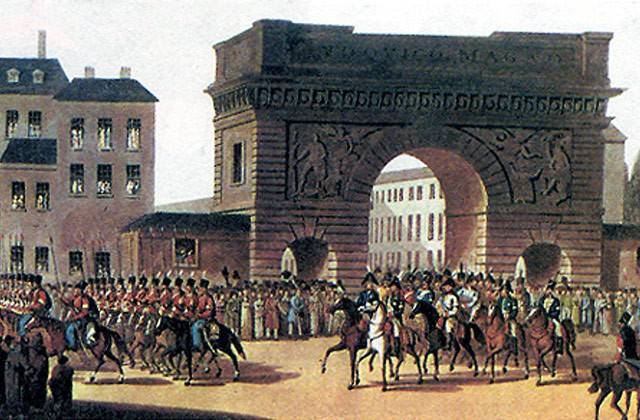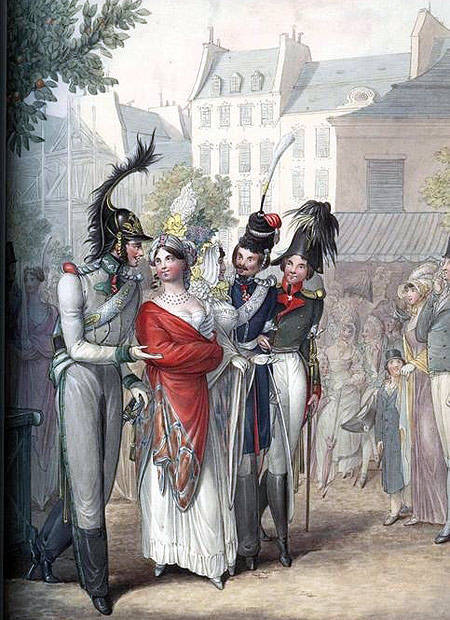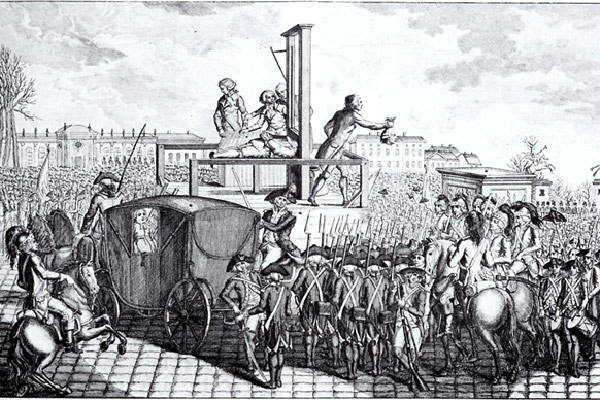The frustrated partisans of Bonaparte

Why did the allies take Paris in 1814, and the French partisans did not appear
As soon as it comes to the Napoleonic wars, almost everyone will remember the Russian partisans 1812 of the year, and many will recall the partisan "guerilla" in Spain, which also brought a lot of headache to the French emperor. Especially advanced military experts stories Prussian guerrillas from 1813 Landwer will also be remembered.
But I think I’m not mistaken if I say that almost no one remembers the French partisans. No, this is not about the rather well-known "Wanderers" of the Jacobin era and the Directory. It's about something else ... When Napoleon triumphantly entered foreign capitals, he ended up always faced with a partisan war of varying degrees of intensity. When the allies from Russia, Austria and Prussia entered 1814 in France and eventually occupied Paris, the French partisans were left almost unnoticed. At least not seen for history.
The very same allied command of the anti-French coalition in December 1813, deciding to force the Rhine and finally transfer the war to France, was very afraid of guerrilla warfare. They still very well remembered the popular enthusiasm of the French during the revolution of twenty years ago. Everyone, especially the Russian emperor Alexander I and his headquarters, knew very well from their own experience what a national war against the invaders could threaten.
Understanding all this, and Bonaparte himself - his experience of war with the partisans, albeit one-sided, was more than that of the Prussian king, Russian tsar and Austrian emperor combined. Since the end of 1813, the lord of France has developed truly Napoleonic plans for his partisan war.
Napoleon planned to inflate its flames in a military manner - at the headquarters of each French army, a general was appointed to be in charge of the armed uprising and training of partisans in each specific department of France. The formation of partisan detachments was hampered by the lack of guns - after protracted and unsuccessful wars, on the eve of the Allied invasion of France, Napoleon lacked them even to arm the recruits of the regular army. Nevertheless, the organizational structures of the future partisan Bonapartists were created and exerted influence on the enemy by the very fact of their existence.
"The separation of Napoleon from France"
On the eve of the invasion of France, the Allies launched a real propaganda attack. They quite reasonably began to “separate Napoleon from France,” that is, the formation of French public opinion in a way that is convenient for the anti-Napoleonic coalition. Since October 1813, anonymous letters have flowed to the largest cities of France, stating that it was the Allies who would bring peace to France, tired of the war, and only the stubborn Bonaparte, blinded by its former glory, was an obstacle to this. Such propaganda was understandable and logical for all French inhabitants - the benefits of past victories faded away, while the endless war in France got almost everyone.
The last three months of 1813, the Allied army, prepared for the offensive, stood at the borders of France on the east bank of the Rhine and carried out a propaganda attack on Napoleon’s positions. The Foreign Minister of the Austrian Empire Metternich quite frankly voiced the essence of this propaganda training: "Our moral goal is obvious - we are working on the spirit of France."
"French people! Do not believe the false rumors that ill-wishers dismiss; consider the allied monarchs only as supporters of mercy, who fight only against the opponents of the world, ”said the appeal of the allied monarchs to the inhabitants of France.
Napoleon could not leave this dangerous challenge unanswered. However, here he found himself in a very difficult situation, since the Russian tsar, the Prussian king, and even the Austrian emperor, after all the events of the beginning of the 19th century, had the full moral right to speak about repelling Napoleonic aggression and fighting for peace for all of Europe. Napoleon, for obvious reasons, would have looked very unconvincingly in the role of a sincere peacemaker.
Therefore, Bonaparte was able to use only frightening rhetoric. "Poland, Poland, humiliated, divided, destroyed, oppressed, is a terrifying lesson and alive for France, threatened by the same powers that fought for the remnants of the Polish monarchy," he scared the French in their December 1813 speech before the Legislative Assembly of their crumbling empire .
Napoleon called on the French nation to rally to repel foreign armies. “A year ago, all of Europe was for us, today all of Europe is against us,” he said, and argued that the whole country would be the only salvation “to arm in case of an invasion — then the enemy would either flee the country or sign a peace favorable to France.”
But the tired French were increasingly inclined to end the endless war. Then on the penultimate day of 1813 of the year, December 30, Emperor Bonaparte publicly stated in the Senate that he was ready to accept the terms of peace proposed by the allies. However, he stressed, such a world would deprive France of Alsace, Brabant and many other territories. The emperor was clearly waiting for the French, outraged by these potential losses, to demand that he not accept humiliating peace conditions and wage war to a victorious end. Bonaparte miscalculated. With a majority of votes - 223 votes for and all 31 against - the Senate of the French Empire recommended Napoleon to accept allied peace proposals. The next day, the French Legislative Corps was disbanded by the decree of the offended Bonaparte. The war for the spirit of France, the brilliant commander finally lost.
"Soldiers are like children"
In January 1814, the Allied armies crossed the Rhine and for the first time since the time of the Jacobins invaded the territory of France proper. In reality, Napoleon’s martial law was almost catastrophic. The allied 200-thousandth army, perfectly prepared, armed and equipped with everything necessary, was opposed by the 46 of thousands of French who lacked everything from rifles to overcoats and saddles. In addition, French troops were caught in a typhus epidemic.

In such circumstances, the Allies could quickly, in a few weeks, march to Paris. But the mighty headquarters of the Russian tsar, the Prussian king and the Austrian emperor literally intimidated themselves with the potential partisan war in France. Although the propaganda campaign of the “struggle for peace” was clearly won, the Russian-Prussian-Austrian generals were well aware that when the invaders began to trample the French land, the guerrilla war would begin automatically - and not for the preservation of some Belgian Brabant as part of France, but simply because that foreign soldiers took horses, bread, etc.
It should be understood here that at the time - when the canning of products had barely left the stage of scientific experiments, and until the first railroad remained ten long years - the troops were inevitably supplied by the local population. A large army concentrated in a fist on a large march could not be fed by any wagons, so the troops inevitably resorted to requisition. Even if there were no direct robberies, and for the “requisitioned” people honestly paid with money, a large number of troops, passing through any area, inevitably “completely devoured” it in the literal sense of the word, like locusts. It is clear that, with such attitudes, the local population began to feel acute hostility towards foreign troops, regardless of political tastes.
An unpleasant appendage will be another “ambush” on this path - to put it in general wisdom, “soldiers are always like children,” that is, they strive to steal, break, take away and offend something. Austrian and Russian generals had no illusions about the quality of their soldiers - the Austrians knew for sure that the Magyars and Croats would rob them, and the Russians had no doubt that the Cossack regiments competed with them. Only Prussians were convinced of the discipline of their soldiers with naivety and arrogance.
In general, the coalition command, both from his own experience and from the negative experience of Napoleon, understood perfectly well what the forced march to Paris would become. Therefore, the Allies invaded France, not with concentrated strike fists, but with scattered columns and very slowly. This violation of the basics of the strategy was dictated by the desire to by all means avoid a frightening guerrilla war. Widely scattered throughout France, the individual columns of the Allies did not so "leave" the terrain than if they were all together. A slow, almost turtle advance allowed us to supply the advancing not only with local resources, but also with the help of horse drawn carts from the other side of the Rhine.
Archival documents show well what efforts the leaders of the anti-Napoleonic coalition made in order to keep their troops from any damage to the local population. The order of Alexander I on the Russian troops on the eve of the offensive at the end of December 1813, said: “Surely sure that you will defeat it with your generosity in your enemy’s land, as much as weapons". 8 January 1814, already on French soil, issued a similar general order to all coalition forces, which strictly forbade any offense to the French population.
But "soldiers like children" - orders and good advice are not always heard. Just a few days after the invasion of France, the Russian generals anxiously reported to their commander-in-chief, Barclay, that the Austrian marauders were “wandering around the villages,” and their bosses could not cope with them. As a result, the Austrian commander-in-chief Schwarzenberg was even forced to ask the Russian tsar to send the Cossacks "to gather the staggering soldiers."
The Prussians did not lag behind the Austrians and Russians either. The Prussian General York bitterly remarked: “I thought I had the honor of commanding a Prussian army detachment; now I see that I am commanding only a gang of robbers. ”
"Return to 1793 year"
Remembering perfectly well how and why the partisan war against his own soldiers so quickly flared up, Napoleon issued a secret order to residents of the occupied regions in mid-January 1814: "Exterminate everyone to the last soldier of the coalition army, and I promise you a happy rule." The order strictly forbade supplying the enemy with food and obeying his orders, and also instructed all French citizens from 16 to 60 years to be ready for March 1 to join the army. For refusing to obey these orders, Bonaparte’s order threatened to be shot immediately.
As a result, the documents of the Allied Command recorded that in January-February 1814 in certain areas of Lorraine, Franche-Comte, Burgundy, Champagne and Picardy "the peasants were armed with pitchforks and old hunting rifles and attacked small or just defeated troops."
However, the mass and large-scale partisan war of the French against the anti-Napoleonic coalition did not come to that. First, as already mentioned, the Allies carried out (and continued to lead the entire attack) a very competent and successful propaganda campaign for peace. Secondly, the persistent and systematic fight against robberies still bore fruit - admittedly the two warring parties allies robbed and killed the French much less than French troops in other countries, especially in Russia.
As a result, as Jean Tulard, a French historian leading in the 20th century, who specializes in the Napoleonic wars epoch, notes, “the enemy as a whole met with apathy and even complicity.” At the same time, historians note that Napoleon had a chance to raise popular enthusiasm in repelling foreign invasions, he turned to the old revolutionary and Jacobin traditions. In those days, many advised the emperor to "return to 1793 year." “He had the thought to follow this advice for a minute,” the former private secretary of Bonaparte later recalled, and in those days the prefect of the Paris police, Louis Bourien.
In those last months of the Napoleonic empire, many Jacobins who had previously emigrated from the persecution of Bonaparte returned to France, ready to temporarily forget the past and stand up for the post-revolutionary country. Napoleon, indeed, hesitated - almost removed the police pressure on the Jacobins and other "leftists." But in the end "to return to 1793 year" refused: "This is too much - I can find salvation in battles, but I will not find it among violent madmen! If I fall, I will at least not leave France the revolution from which I have saved it. ”

It seems that the ingenious emperor here is somewhat cunning. From the “1793 of the Year”, he was restrained by something else - becoming again the first general of the revolution from the emperor, he automatically lost any hopes of an honorable peace with the monarchies of Russia, Britain, England and Prussia. The defeated monarch could still count on an honorary exile, while a revolutionary general could only count on a wall ...
But the main thing is not even that - Bonaparte was a brave man - much more than death, he was afraid of losing power, the status of the first and only. “Returning to 1793 Year,” even if successful, would permanently deprive him of this one-person, crystallized only in him power, with which he has become akin to the last 15 years.
Therefore, the revolutionary war, where he would already be only the first among equals, the falling emperor preferred the only means, where he was not equal then, a maneuverable war of regular units.
The extremely cautious and sluggish strategy chosen by the allies for the offensive by scattered forces played a role in the fact that the French population was in no hurry to rise to the partisan war. But this same strategy gave Napoleon, a recognized master of maneuver, the opportunity with his few forces to inflict several offensive defeats on the upcoming allies.
Bonaparte had to fight poorly trained and armed 16-summer recruits, but that dozen of the battles given in February-March 1814 of the year (from Shampober to Fere-Champenois), military historians of the world are rightfully considered the pinnacle of Napoleon’s genius tactics. But with all the brilliant tactics, the strategy was already lost.
"Not located to defend against the forces of the Allied ..."
The Allies were slowly but surely approaching Paris. Their skillful counter-attacks of Napoleon and all the same fears of a big partisan war have slowed them down. At the same time, the longer the Allied forces marched to battle in France, the higher the danger became that individual partisan incidents would merge into a large French guerrilla. Here, the time factor solved everything - the longer the war, the wider the partisanship.
From the quick capture of Paris, the Allies largely kept all the same fears of a popular war. The largest city in Europe - over 700 thousands - scared the upcoming monarchs with the ghost of tens of thousands of yesterday's sans-culottes. But 23 March 1814 Cossacks Platov proved that they are capable not only of robbery - they intercepted the French communications with the report, in which the police of Napoleon’s empire Savary reported to Bonaparte that Paris was not determined to fight against the allies.
"Neither the inhabitants of Paris, nor even the most national guard are not set up to defend against Allied troops ... There are no troops in the city, except for the national and a few old guards," Major General Vasily Kaysarov, Chief of the General Staff of the Russian Army, happily informed Peter Volkonsky.
On the morning of March 24, 1814, Tsar Alexander I, right on the road, held a meeting with his generals - whether to chase the invincible Napoleon or in the light of new data, go straight and take Paris. It was decided to beat right in the heart of France, since it no longer burns with revolutionary enthusiasm.
“Paris is worth Mass” - the Russian Tsar did not have to shout. Paris cost him 6000 Russian soldiers killed by 30 March 1814 of the year in a frontal attack on the fortified heights of Montmartre, where one regiment of Napoleon’s old guard sat down. In the event of resistance of the whole city and the construction of barricades, the allied army would hardly have got out alive from Paris ... But there was no barricade - the fatigue from a long war and the successful propaganda campaign of the allies affected.
Instead of the revolutionary “Committee of Public Salvation”, on April 1 of the year, a completely servile Senate gathered in Paris, which obediently announced that Bonaparte was deprived of the French throne. Some historians believe that it was in this way that the "Day of the Fool" arose ...
When he learned that his capital was in the hands of the Allies, watching as the Parisians and other Frenchmen were in no hurry to attack the invaders with all the people, Napoleon also capitulated and signed a renunciation. The guerrilla war in rural France had barely started from January to March in rural France, and had not yet begun.
Information